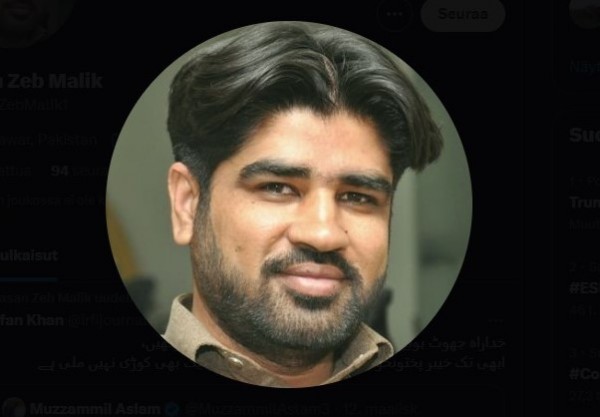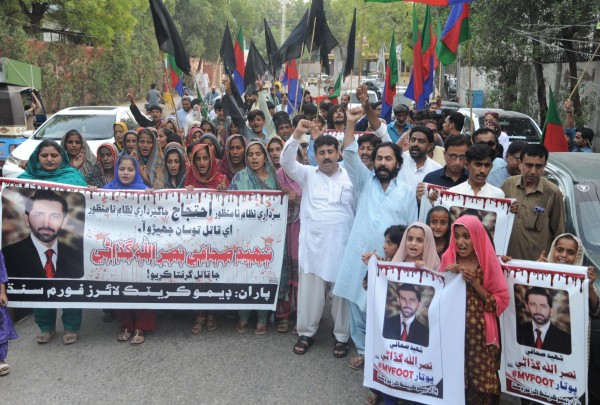Umar Cheema is an award winning investigative reporter for The News, the largest English-language newspaper in Pakistan. In September 2010, he was kidnapped, tortured, blindfolded and handcuffed, and finally dumped outside Islamabad by masked men, who warned him not to speak about the incident. After his release, Cheema immediately went on television to tell his story.
Since 9/11, under Pervez Musharraf, the media was allowed to diversify and spread. In 2008, the country moved from military to civilian rule. But at the same time, violence spilling over from the war in Afghanistan has made life more dangerous for many.
IPI spoke with Umar Cheema on 7 September about the media environment in Pakistan, how the diversification of media since 2002 and the ten year-old War on Terror have affected journalist safety, and how an entrenched culture of impunity – including for those who attacked Cheema and killed far too many of his colleagues – continues to cast a pall over journalism in the country. Here are some excerpts of that conversation:
Since partnering with the United States in the so-called “War on Terror,” has Pakistan adopted any legal measures that impact the media?
It has tried different laws, particularly curtailing the functioning of the electronic media, […] but due to the protests and due to the strict opposition government has failed to do it but they have tried to use it under different pretexts. But the major threat to the media is the situation – unfortunately we have different volatile areas in Pakistan for example in Balochistan, the tribal region, bordering with Afghanistan and also Karachi, there is organised crime and other militant things. They have trained their guns at the media, and different media people have been killed. So instead of the laws, we face a major problem due to different non-state actors as well as sometimes the state actors. The media feels sandwiched between the military that is fighting against the militants and the militants.
Before 2002 there was only one state run television and after 2002, now we have now around 90 television channels, and many of them are current affairs programs, so there are different opinions being aired and the government is feeling heat. Now different measures are being used — for example an emergency was imposed in October 2007 — and a number of channels were put off air. The channel I work for, […] is the most popular television channel, it remained off air for 73 consecutive days.
After 9/11 the media in Pakistan grew in space and size. It has become very vocal, but at the same time it has become political. The media industry as a whole has grown, but it has faced enormous risk and the risks are fatal risks. Previously, when [journalists] were sent to jail, one thing that was sure was that they would return alive. Now many journalists have been killed, and in 2010 Pakistan was considered the deadliest country for the journalists because 11 journalists were killed. So far, in the running year, eight journalists have been killed and the year is yet to be completed and I’m afraid that this year Pakistan will continue to retain its title for being the deadliest country in the world for journalists.
Have there been efforts to ensure journalists’ safety or any recognition of the role that journalists play?
As far as the journalist community is concerned, it is strongly supported by public. People realise; people acknowledge their efforts, they acknowledge their sacrifices, they realise that they have put their lives at risk while discharging their duties. But at the government level there is no serious effort and, just imagine, so far in the history of Pakistan not a single murder of a journalist has been properly investigated, and in not a single case have the murderers been brought to justice.
There is only one example and that is of Daniel Pearl, and again he was an American journalist, and the whole prosecution was motivated by American pressure because the government was under intense pressure to get to the culprits. And you know if they can do it in that case then they could have done it in the case of Pakistani journalists, but it has never been done because [those journalists] have the Pakistani passport, and there was no external pressure on the government in this regard.
How have counter-terrorism efforts affected the way the government handles the media?
There is no co-operation from the government’s side. The government always says that the media should help the government in fighting this menace, but they are never taken into consideration. Even the political parties are never taken into consideration.
They themselves don’t know what they have to do and [they have taken] ad hoc measures to fight this menace of terrorism, and this has caused enormous suspicion among the public, amongst the media community. They may not be toeing the Washington line, but no one wants violence, nobody wants conflict to continue in Pakistan. Everybody has their own opinion but the major complaint goes to government that has never tried to build any consensus.
When journalists criticize or call attention to some of the problems you just mentioned, how are those critical pieces received?
Any such report is not greeted warmly. Rather they would say that they are trying to defame, that it has been misreported, they don’t know the reality. But they have never bothered to share any details, they have never bothered to take media into consideration. But obviously they don’t take it easily. [Criticism] is not well received at the government level.
The present government creates fear amongst the people when it is criticised. They would say that these critics don’t want the civilian government to work, but the civilian government never tries to address the concerns being shown in the media to the public.
How are investigations into the abduction and torture you suffered proceeding?
The state of my investigation is not different to the previous cases, but there is a difference because first of all, mine was the first case where I spoke up. [When] journalists were roughed up in the past, or were pressured, they were terrorised and told not to speak about it because it could bring them more trouble. But I had a different thought about it. I thought that I should speak up and this has created a resonance with the public and the government was forced to do something, at least show that they are trying to investigate the case.
[…]
The [criminal investigation body] has made zero progress; they have failed to make any headway. The reason is the lack of will. They don’t have the courage to go after the culprit. As far as the judicial commission is concerned, they are not a law enforcement body. They have to do fact-finding [and would not publish the results of their investigation until required to do so by a Senate committee].
If history is any guide, I don’t see the case heading to any conclusion. They will just keep buying time and it will continue.
Does this lack of action send a message to the media?
Absolutely. One colleague, Salim Shazad, was abducted and he was killed. It has sent a shockwave amongst journalists, and they have become more afraid, and not only them, their families as well. They face the fear that if they are doing investigative journalism, if they are doing reporting, they could face the consequences that Salim Shazad has faced. Although media personnel have put up a brave face they are treading very cautiously.
At the start of this year, one other colleague, Wali Khan Barbar, was killed in Karachi and in that case, only recently one of the government’s functionaries -he was a home minister in the province where Karachi is situated – he made it public that, according to their investigation, Wali Khan Barbar was killed by one political party that was allied with the government. But again the government is not following the case. They are only allegations and counter allegations on whether the investigation report was fake or whether it was genuine, and nobody is serious in following the case.
On the challenges going forward…
We don’t have any functional Information Act. [There is no] petition for getting any specific information, public information, from the government’s side, and in many cases it happened that whenever somebody applied for it, it was denied under different pretexts [even despite, in one case, a court decision that a certain piece of public information was public].
Whatever information we receive is through our personal contacts, and most of the time they feel insecure. We have to keep them anonymous so that they won’t be harmed. You know, through this process, speculative journalism is becoming a trend. Sometimes the government complains about speculative journalism, but they don’t encourage investigative journalism.
We are planning a needs assessment study of our investigative journalism, because I plan to set up a centre for investigative reporting in order to train more journalists in this craft, in order to put the government on the defensive, to hold the government accountable in a forceful manner, and in order to make the journalists realise that these are their rights, and we should make concerted efforts to get our rights: and these are the right to know, the right to know what the government is doing.
Want to see Umar Cheema speak? Mr. Cheema will be part of a panel on Money and the Media on 26 September 2011, as part of the IPI World Congress in Taipei, Taiwan. Find out more about the panel and the rest of the conference programme here.


